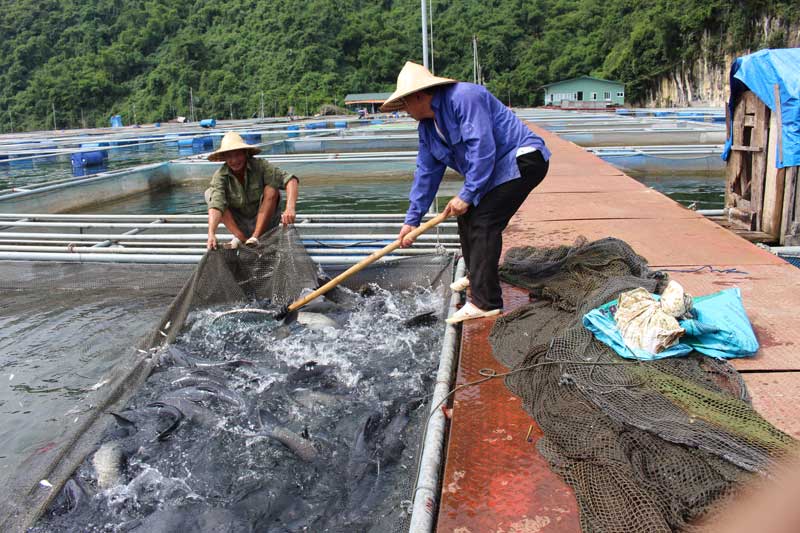
(HBO) - Blessed with favourable natural conditions of the lake area, the caged fish specialty of Hoa Binh province has been known wide and far by many consumers.
Along with increasing the number of cages, attention
has been paid to strictly controlling food safety quality, the factor that
determines the sale of product.
The linkage between production and sale of products of fish raised in cages in Da
river in line with the value chain was built by the locality in 2017. The model
continues to prove effective, creating an open direction for businesses and
locals to participate in the production and trading of local cage-fish, thus
reaching a larger market.
 The Da river caged fish chain meeting VietGAP standard
produced by the Hai Dang Seafood Co., Ltd in Cao Phong district and Hoa Binh City is
favoured by Hanoi consumers.
The Da river caged fish chain meeting VietGAP standard
produced by the Hai Dang Seafood Co., Ltd in Cao Phong district and Hoa Binh City is
favoured by Hanoi consumers.
Hanoi'
customers now prefer dishes processed from Da River specialties when they visit
more than 30 restaurants which join the clean food chain provided by the Hai
Dang Seafood Co., Ltd. The volume of fish supplied by the company to the market
has been increasing thanks to its prestige and its products meeting VietGAP
standards.
Notably,
connection programmes for sales have been conducted regularly by the provincial
Department of Agriculture and Rural Development. The Da river fish products
were introduced and registered to participate in the safe meal programme in Hanoi and the trade promotion
conference in Son La province.
Especially, at "Da river fish week in 2018” to introduce and promote clean
fish specialty in Hanoi, more than 1 tonne of Da river fish belonging to the
value chain was sold.
With key products made from traditional fish species such as black, yellow and
dotted hemibagrus, cranoglanis,
sturgeon, carp, black pike, and tilapia, Hoa Binh has two units and 10
households joining the value chain with a total of over 300 fish cages, supplying
over 800 tonnes of products per year.
Da Bac district has Hien
Luong agro-forestry business and production service cooperative and 10
households participating in the chain, with 93 fish cages, turning out over 300
tonnes of products per year.
Currently,
in addition to supplying safe fish products to the Hoa Binh market, a system of
shops to introduce and supply safe cage fish in Da river was formed in Hanoi.
Hoa
Binh’s fish products were certified to meet standards on food safety and
origin. This helps the caged fish value chain in Da river have stable market,
with the selling price always 20-30 percent higher than that of same product in
the market./.
In Lac Thuy district, communes have been succeeded in promoting their One Commune-One Product (OCOP) products while others are still struggling to position their typical farming products in market. Some communes in the district still fail to have their products met OCOP programme’s requirements, while others have seen their certifications expired.
The inspectorate agency of Hoa Binh province has issued Official Dispatch No. 1090/TTr-PCTN to provincial departments, agencies, localities, business associations, enterprises, and investors regarding measures to improve informal component indexes of the Provincial Competitiveness Index (PCI).
Hoa Binh is taking concrete steps to improve its investment environment, with a strong focus on supporting businesses, settling obstacles for strategic investors, and creating opportunities for robust development in the coming years.
Under the blazing early summer sun, the construction site of Nhuan Trach Industrial Park (IP) in Luong Son district is abuzz with activities from dawn to dusk, a testament to the determination of the investor to meet their construction targets on schedule.



 The Da river caged fish chain meeting VietGAP standard
produced by the Hai Dang Seafood Co., Ltd in Cao Phong district and Hoa Binh City is
favoured by Hanoi consumers.
The Da river caged fish chain meeting VietGAP standard
produced by the Hai Dang Seafood Co., Ltd in Cao Phong district and Hoa Binh City is
favoured by Hanoi consumers.